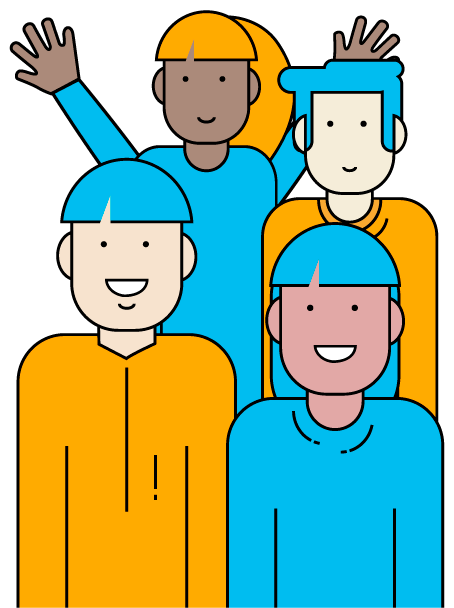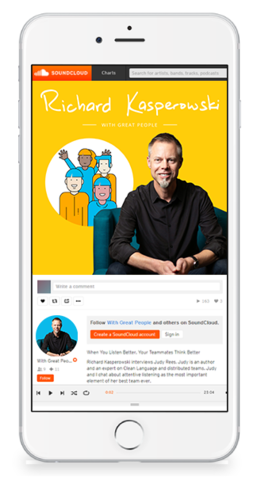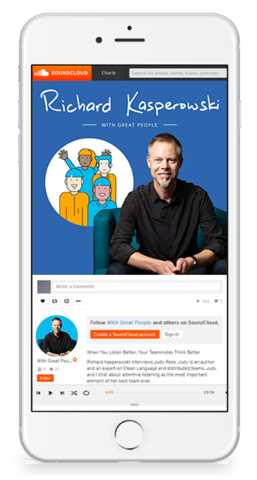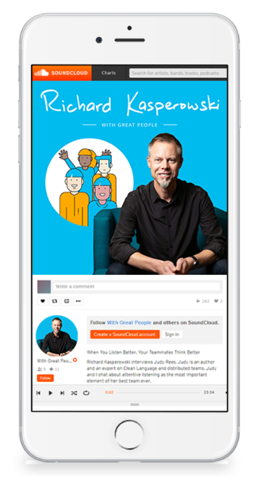Categories
Joshua Kerievsky: How to Grow from a One-Man-Show into a Global Team?
Richard Kasperowski interviews Joshua Kerievsky. Joshua is the creator and steward of the Modern Agile movement, CEO of Industrial Logic, and the author of the award-winning book, Refactoring to Patterns. He tells us the story of how he grew Industrial Logic from a single-person company into a global team of experts. A little tip – he first turned it into an exciting duo! When you finish listening to the episode, connect with Joshua on Twitter and LinkedIn.
Joshua Kerievsky: How to Grow From a One-Man-Show Into a Global Team?
with Joshua Kerievsky


TRANSCRIPT
Richard: (00:12) Hi friends. Welcome back to With Great People, the podcast for high performance teams. I’m Richard Kasperowski. In this episode, I talk with Joshua Kerievsky, CEO of Industrial Logic, one of the oldest and most well-respected agile consultancies in the world. Joshua is the author of the award winning book, Refactoring To Patterns and the creator and steward of The Modern Agile Movement, which is helping people in organizations benefit from a principles based approach to agility. Joshua tells us the origin story of Industrial Logic, a two person team developing the website for MTV back in the mid-90s, and how this experience propelled him to leading a global team of experts. To support this podcast, visit my website, kasperowski.com.
Richard: (01:00)
We’re here with Joshua Kerievsky. Hey Joshua. How’s it going?
Joshua: (01:05)
Real good, real good. Glad to be here. Thanks for inviting me, Richard.
Richard: (01:08)
Yeah, you got it. Will you introduce yourself to our listeners?
Joshua: (01:11)
Yeah. I’m Joshua Kerievsky. I run a company called Industrial Logic. I’m a author and speaker and practitioner of Agile and Lean, I created something called Modern Agile recently, I’m the author of Refactoring To Patterns from many years ago, and I’m a parent and a dog owner, two dogs, and I live out in California.
Richard: (01:33)
All right, cool. So this is the podcast about teams, the best teams that people have been on in their lives, and how to get more of that for our listeners. As you look back in your life, what’s the best team that you’ve ever been part of in your life?
Joshua: (01:46)
Well, of course it’s a tough question because I’ve been on lots of different teams in different contexts. If I look back at some of the biggest highlights of my career, there’s two that really stand out. One is, winning a gig with MTV in the early history of Industrial Logic. So we’re talking about 1996 and winning a bid to basically write mtv.com in Java back in 1996. And so we won that bid, we did the work, it went live, millions of people used it. We won an award for our work and it was incredible, absolutely incredible. Very early days of Java in the browser, for example and these days with no industrial applets anymore.
Richard: (02:30)
Yeah, jeez, way back in 1996, that’s back when Java was new. There was no Legacy Java.
Joshua: (02:33)
Yeah, that’s right. That’s right. We had Netscape 2 was the first browser with Java in it and quickly Internet Explorer came along with some Java in it as well, so IE3 and I paired up with another fellow named Kevin [inaudible 00:02:54] and a couple of other friends. Kevin and I did most of the work involved. I involved a few other friends for some supplementary goal things, but the most part, it was a small team. It was, there was the two of us teamed up with some faults in MTV and that was just an unbelievable time and accomplishment. The other one was building a Birdie learning software for, we built these eLearning platform and eLearning content and sold it to Google and many other companies, general electric, lots of large companies have used and it also has been a huge highlight. Incredible team working on that and yeah.
Richard: (03:32)
Cool. Let’s talk about both. We’ve got, we’ve got the MTV team, basically two people. We’ve got the eLearning platform team, much larger team. How big was that team?
Joshua: (03:40)
Not much bigger, but I mean six people or so. Six to 10.
Richard: (03:41)
Okay. Now, if you took yourself back to one or both of these teams, like if you could go back in time to 1996 or back to when you’re doing the elearning platform and you were working with those people and doing that work together, discovering the new tools, creating things together, what did it feel like to you and could you summarize that in one word?
Joshua: (04:04)
Exciting.
Richard: (04:05)
Exciting. What about exciting? How could we expand on that?
Joshua: (04:09)
Well first of all, I come out of working on Wall Street, which you might think was dreadful, but it wasn’t at all. It’s actually quite interesting. Lots of cool projects there but completely different culture than MTV, MTV then it’s different, it became more corporate. But back then, there were like kegs of beer in the office and people playing video games and seems like very few people working. So that’s very why that they got us involved. It was exciting to work on the proposals because we had to actually had to win the bid. So they took three or four months to win the bid and talking about, I mean, we talk about don’t do upfront design, blah blah blah blah blah. Well, they wanted a very clear design that we show true that we had the chops to pull this off. They want it to be able to almost change the entire behavior of mtv.com without programming.
Joshua: (05:07)
So we had to invent a little programming language and environment that would let them modify the behavior and what can feel of mtv.com in Java. Very sophisticated ass. And we proved to them through our design that we had the solution. So that was wonderful, because it basically took every last bit of our creativity. We had to draw from our experiences, the programming, our experiences with design, especially in design patterns, played a huge role in this. Our experiences just communicating clearly to the customers. So we had to create documents and have meetings and these documents had to be ultra clear about how this design would work and it was just extremely entrepreneurial. I would make business cards for my friends, get them printed, and we’d go in and pretend we’re a company cause it’s like two 96 I’ve just started the company.
Joshua: (06:03)
We didn’t have a logo, we didn’t actually have a logo at the time. In fact, after winning the MTV gig, we ended up getting some more in from us and graphic artists from MTV to make our logo. Our logo was created by MTV artists so it was like a super exciting time. It was also extremely constructive to me because it was not easy, in the sense that nothing was easy about it. The waiting during the time of trying to win the proposal was really difficult. At a certain point, they stopped communicating with us during the proposal process. This was probably in the third month and I was like, WTF, WTF, WTF, done all this work, all these meetings, and I don’t hear from them. And we were considering moving to Seattle or California and I was in New York at the time and I called my buddy John in Italy. I said,”What am I do Johnny? We’ve been working our tails off on this thing and suddenly they just don’t completely quiet on us. I’m thinking just moving, you know they’re not going to do this.” He said, “Well, call them one more time. Just swallowing your pride, call them one more time.” So I call them, I’m like, “What’s going on?” They’re like, “Oh, you won. You got it. You did it.”
Joshua: (07:16)
I’m like, “Oh great.” So that, that began a series of several intensive months of programming.
Richard: (07:29)
Oh, that’s so cool. So the team, that was the birth of your company? Industrial logic.
Joshua: (07:35)
Yeah. I started a company by myself, but some months later went to a party and got this guy from MTV who said, “Hey, we might need you sometime.” Then, several months after that, he called me into his office had a meeting and said, you want to put a bid in for this? And then I brought him some friends that, so yeah.
Richard: (07:52)
it’s really cool. And I connect with the story in a lot of different ways. One way, is that you were starting up a small company. I’m running my own little boutique consulting company over here. Also, 10 years later, I was working for a tiny company around Boston building mobile phone apps and full stack front end to back end applications and MTV was one of our best customers. We built something like the first streaming video mobile phone app in the U.S. And I think it was for South park, which was an MTV property.
Joshua: (08:22)
Oh yeah. That’s really neat. Yeah, this was a very interesting time because so many things were changing with technology so much, real incredible stuff happening on the internet and it’s all very new. It was very exciting.
Richard: (08:38)
Cool. All right, so when you look back at this time, this team winning the bid for mtv.com, it’s exciting. That’s the one word to summarize it and a lot more goes into that, feeling of exciting. Do you have any, any sorts of metrics at all for how we could call this the best team? We’ve got this sort of subjective of sense. Subjectively, how is it the best team and then is there anything objective that we could say, “This was definitely the best team of your life.”
Joshua: (09:02)
Objectively, like certainly put us on the map. Suddenly, we were Industrial Logic, unknown company. People were finding us, who built this thing and one guy found me and said, “Hey, IBM’s interested in working with you.” Which, did lead to a contract with IBM back then. So, it was objectively, we did end up, I mean, for example, we built that thing for years. I had source code from that project, that I ended up using for other, we own the code. By the way, our lawyer made it super clear. We own the code. In fact, what we did was very smartly obfuscated the code. My very first internet purchase, I was a little worried because here I am pumping my credit card down for an Obfuscator, it was called Crema and these were written by this genius guy in Eastern Europe and even office Gator Java or [inaudible 00:09:48] did both. So, we bought the office Gator and it worked well.
Joshua: (09:55)
Well, here we’re using the same thing 10 years later for mobile Java apps to make them small.
Joshua: (09:59)
Right, yes. That was the other thing we learned on this project because you’re still dealing with modems back then. So, we had to make the job as small as possible and that meant, at times, doing things that were not very object oriented. Believe it or not, polymorphism was led to a bigger download. So, in certain respects it was very polymorphic. But, in certain areas we deferred to if/else statements, if/else/else/else statements rather than polymorphism because literally had a major impact on the size of the Zip downloadable and there was a cap and there was a, whatever it was anything to make it faster for people. We went with.
Richard: (10:39)
Exactly. Yeah. Yeah. 10 years after, that on mobile phones is before iPhones. Same thing. Mobile phone data speeds were the same as modems in 1996.
Joshua: (10:52)
Yeah. They’ve always been concerned. So, that’s an amazing thing. Objectively, like in terms of how much money we made from that. It was a tiny, tiny amount of money. I didn’t know how to negotiate. We made barely anything. It certainly we made a lot in terms of our reputation and having war stories and taking even the code we were using it. So there was a lot of wonderful outcomes from that.
Richard: (11:18)
What were some of the specific things you did together, this approximately two person team. You and Kevin trying to win this bid. What were some of the things that went into the success of the team?
Joshua: (11:28)
We meet a lot. I play nice places like Central Park, do work on the proposal. We would constantly be working together on documents and then, of course, programming. We collaborated quite a bit on the programming and we also did some solo work and merge our results. So, we did some divide and conquer as well just to, because we could, we did speak the same language. I mean we really, Kevin had been in my design pattern study group in New York City. It was a weekly group that met to study design and so that’s how I’ve gotten to know him. So, in terms of our ability to communicate, it was very, he also worked at Bankers Trust, right where I had been working and I talked to him to help me on this project cause I knew his capabilities but we spoke similar language and so we can communicate very rapidly with each other and work together a lot.
Joshua: (12:21)
So, it was excellent collaboration and we both worked quickly and with high quality. So, that just led to wonderful results and bug-fixing situations and stuff like that. It was not easy because you literally, things would work in Netscape 3 but they wouldn’t work in Netscape 3.01. Literally, Netscape would have put out the browser with a bug in it, that broke mtv.com. So, here you have mtv.com live, went live, I think in November or December of 1996 and suddenly with 3.01 that’s paid, it was breaking and we’re like panicked. So, we actually had to further screw up the design, make the design even worse to get around their bug and have a live version that worked. Meanwhile, the original code that worked for 3.0, that skipped 4.0 beta. So, we had crazy panic moments like that, there was a lot of craziness. It wasn’t like nine to five. It was just a glorious achievement. I mean, when I went live and millions people are using it, it was just like, wow, this is just phenomenal.
Richard: (13:30)
Yeah. I know another word you used was entrepreneurial and I get that spirit from like just when things go wrong, you just take care of it right away. Whatever it takes, like you talked about.
Joshua: (13:40)
Yeah, and back then it was like the early days of my company, I barely knew what I was doing, but in terms of being this person, and yet it was like, okay, let’s make this customer super happy. We were so focused on that and I remember going in for one demo in their office and like they’re like, this is incredible you guys and this is just an amazing thing you’ve done.
Richard: (14:04)
It looks like you haven’t slept for many hours.
Joshua: (14:08)
We had been up late getting that demo working perfectly and so it pushed us hard. It really pushed us hard. It’s funny when people talk about sustainable pace. I mean, I was in my twenties and I had tons of energy and very few commitments and that was fine for me. That’s perfectly fine. I didn’t need a nine to five situation there. I was gung ho to get this thing going and it was just, it challenged every fiber of my being to make this thing work and that was, I liked that.
Richard: (14:44)
Yeah, and then so awesome team, you and Kevin winning this bid, doing this awesome work for MTV, keeping it up and running in the face of web browser innovation, web browser upgrades, breaking the code on you. If you were to take a new team today and give them advice, how to repeat some of that magic from this MTV bid winning team, what advice would you give a new team today, to get into that state of best team? Again on purpose.
Joshua: (15:10)
First of all, like what I’m really proud of is that MTV said, “This has to look perfect on every browser and has to look exactly the same on every browser.” So, we threw out things like the abstract lending toolkit, which was not good. So, we came up with our own custom approach to making it work. To look exactly the same on every browser. So that wasn’t some, so, technically we knew what to throw out. So, in other words, if I were to advise them on the team, I’d be like, I think picking technologies is really important, picking what to use and what not to use. It’s super important and it takes some attorney there is to know what is good technology to build on and what isn’t. That’s can make or break a project. Going back to mobile. I mean, I remember we did a mobile project seven or eight years ago, using the one of these tool kits that allows you to write it in such a way that it was called a Phone Kept, Phone Down, something like that.
Joshua: (16:04)
It didn’t really, it didn’t really live up to its marketing hype. So, it was a disaster. It was done. I mean, it wasn’t disastrously delivered, but it was just horrendously difficult. So first of all, it’s great to work with people that you know really well and you speak the same language and you’re physically co-located it, or at least, Kevin and I were in different parts of New York City so it’s a pain in the neck sometimes get places in New York city.
Richard: (16:27)
You might as well be in different countries, if you’re off to the sides of New York.
Joshua: (16:30)
Yeah. So we would, we would call each other on the phone and collaborate that way. And then other times we’d meet in person. So there was a mixture of both. But, really it was that we knew each other. We spoke with similar language and very similar value systems in there.
Joshua: (16:46)
So, we were both completely gung ho for this and just charged up to do this. So, it was just alignment, incredible alignment and we didn’t do any like chartering, formal chartering, like what we tried with you together. It became clear through the proposal process what exactly we were going for. It was super clear. There was no debating what we’re delivering to MTV. So, in some sense we were very aligned because we had built the proposal over many months. So, great alignment is important. Working with people were you speak the same language, being extremely knowledgeable about the technology so you’re ending up choosing technologies that allow you to move quickly. All of that played a major factor so, that’s what I would advise seems to them to look for that. Also, very small team. I didn’t mention there’s a couple of other people, we had one fellow helping with some Pearl or Python. I think it might’ve been, it might’ve been Python, I don’t remember, but it was something for MTV’s newsfeed that just barked beautifully. He was able to help with that and it was great having some collaborators who played a more secondary role but were able to do it and come through for us.
Richard: (17:58)
It was a really, and that was a really definitely a marquee clients, a marquee project. The company became well known because of this, you get other clients from it, and the four things you mentioned alignment, you’re speaking the same language as each other, knowledgeable about the technology, what to use, what not to use, and it was a really small team.
Joshua: (18:15)
Yes. We respected each other’s abilities, so there was mutual respect there. There was no kind of hierarchy situation. Even though, I was the person that kind of initially got all the things started with MTV, I was very much like collaborating, collaborating on this. I could even say collaborating with my lawyer wasn’t a big deal on this one. So, it’s my father’s roommate from college. He was a very good lawyer and that lawyer standing in front of him, he was excellent. I can’t begin to say because he made such a great agreement with MTV that gave them access to our object code and not our source code. They weren’t paying enough to get us, but he was really brilliant in helping us craft that as part of the team, and that was important that we had a good lawyer to cover us.
Richard: (19:06)
Well, that’s a good one too, your lawyer was part of your team.
Joshua: (19:09)
Oh yeah, he was very trustworthy lawyer because he was my father’s roommate from college, family friend, and an excellent lawyer. I mean, I remember paying him a fairly large amounts of money. I was like, yeah, no, it’s worth it. So, that was a level of safety that and cars, he was giving us a family discount so, fine. To me, back then it was a lot of money, but now nothing [inaudible 00:19:32] he was charging but, that was important for this effort so we didn’t get ripped off.
Richard: (19:41)
Cool. Any other advice or anything else for listeners?
Joshua: (19:45)
I would just say developing relationships with people with whom you can really work well and do some amazing things and that’s, that’s really important. Well, I’ve gotten to know Kevin and by working with him at Bankers Trust and also, being part of my design time study group, we studied patterns to get all kinds of patterns, not just design patterns and that builds a relationship over time. I mean, me or the study group, I know we’d all have dinner together. That close relationship enabled us to end up working together in a way that was very, very valuable. It wasn’t like a bunch of strangers coming together, so I think that’s important is finding colleagues that you have close connections with and can do some amazing things with, that was helpful.
Richard: (20:27)
All right, and if listeners want to get in touch with you, is there a way they can do that?
Joshua: (20:30)
Yeah, I’m all over LinkedIn and Twitter. I’m @JoshuaKerievsky. That’s usually the best way to get in touch with me. Direct message me or send me a message on LinkedIn.
Richard: (20:45)
All right, cool. Joshua Kerievsky, thank you so much for joining us today. I really appreciate it.
Joshua: (20:49)
Thank you, Richard. It was a pleasure talking to you and reminiscing about this team, so thank you.
Richard: (20:59)
Hi, friends. Thanks for listening and remember to support this podcast, sign up for my newsletter@kasperowski.com.





